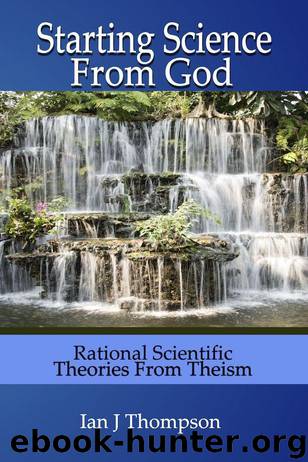Starting Science from God: Rational Scientific Theories from Theism by Ian J Thompson

Author:Ian J Thompson [Thompson, Ian J]
Language: eng
Format: epub
Publisher: Eagle Pearl Press
Published: 2011-11-26T23:00:00+00:00
20.4 Persons and their identity
The system of discrete degrees that comes from an analysis of theism suggests a possible solution to the problem of continued personal identity. In Section 6.5 we saw that, within an ontology of multiple generative levels, there was a sense in which the continued identity of a person could be attributed to some prior degree, especially if this prior degree were relatively unchanging. So, if the prior degree were strictly unchanging during a person’s lifetime, then we would have a means of identifying our personal identity both during our growth and changes in this life and possibly also after the death of our physical bodies. There would then be a core in us that would be the basis of our continued existence, and that could said to be our ‘true self’.
This core, according to our basic theism, is our most fundamental love. For God this core is the divine love. That is clearly his core and the basis of his continued divine identity. For us, it is the love that is the most prior generative degree that can be said to be ‘us’ rather than ‘someone else’. That love is the most constant underlying disposition in our life. It is like Plato’s ‘self-moving soul.’20.3Let us call this most constant underlying disposition our principal love. Because the principal love produces our life, it is recognizable by its effect of producing a ‘theme of our life’. We agree with Hume that this identity is not immediately apparent to our introspection, but that does not make it any less real. Along with dispositions in general, our principal love can be tested by examining skills, character, and performances when there are few or no external constraints, by examining affections in action and in the voice, and so on. Just as physicists test dispositions by experiments and not by mere inspection, so our own identities could be inferred by examining all our characteristic actions more easily than by introspection.
This concept of personal identity as principal love would be most useful to psychology and theology if that love were completely unchanged during our lifetime: from birth to death and even after bodily death. This would require it to keep all the same intrinsic properties even though its effects and relations may vary. Its relation to us will certainly vary as we grow up and later die. It would also be most useful if we could assume that no two people had the same principal love. Then we could be sure not to confuse any two people. Theistic religions claim that we have some kind of continued identity that survives bodily death. I offer the concept of principal love as a candidate for the needed kind of identity.
Download
This site does not store any files on its server. We only index and link to content provided by other sites. Please contact the content providers to delete copyright contents if any and email us, we'll remove relevant links or contents immediately.
The Lost Art of Listening by Michael P. Nichols(7506)
Why I Am Not A Calvinist by Dr. Peter S. Ruckman(4153)
The Rosicrucians by Christopher McIntosh(3519)
Wicca: a guide for the solitary practitioner by Scott Cunningham(3178)
Signature in the Cell: DNA and the Evidence for Intelligent Design by Stephen C. Meyer(3138)
Real Sex by Lauren F. Winner(3022)
The Holy Spirit by Billy Graham(2952)
To Light a Sacred Flame by Silver RavenWolf(2823)
The End of Faith by Sam Harris(2742)
The Gnostic Gospels by Pagels Elaine(2531)
Waking Up by Sam Harris(2460)
Nine Parts of Desire by Geraldine Brooks(2368)
Jesus by Paul Johnson(2362)
Devil, The by Almond Philip C(2331)
The God delusion by Richard Dawkins(2309)
Heavens on Earth by Michael Shermer(2284)
Kundalini by Gopi Krishna(2184)
Chosen by God by R. C. Sproul(2164)
The Nature of Consciousness by Rupert Spira(2108)
